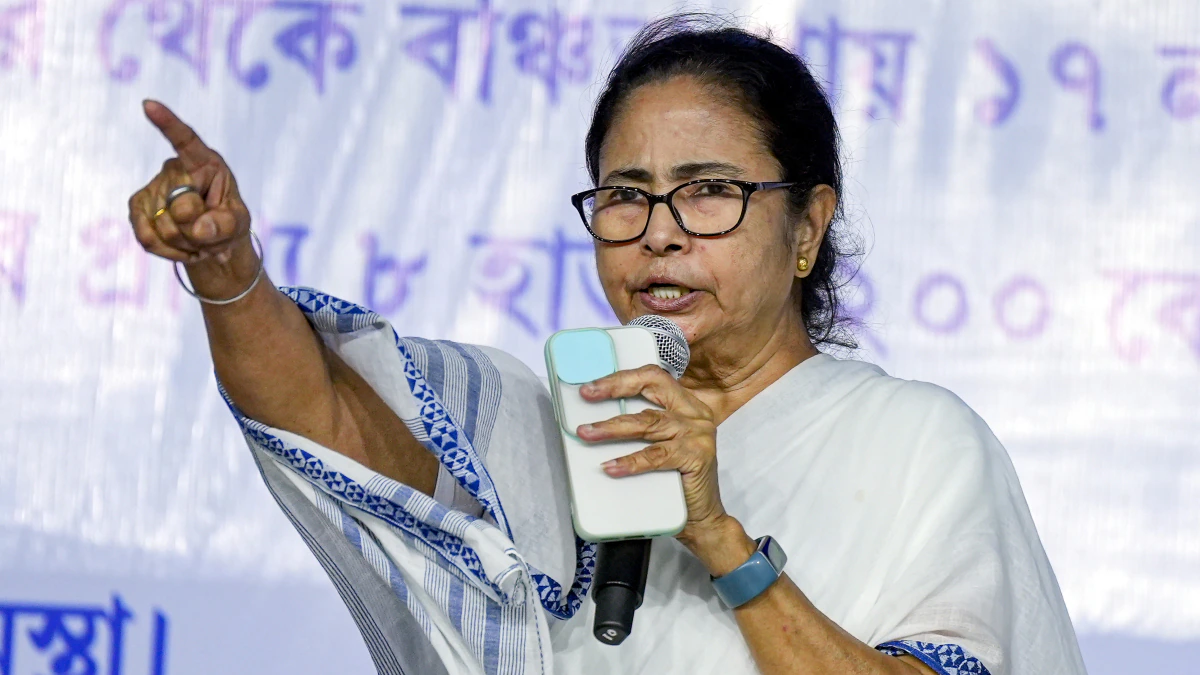NEW DELHI: On Saturday, Chief Minister of West Bengal Mamata Banerjee,walked out of the 9th Governing Council meeting of NITI Aayog in New Delhi. She alleged that she was permitted to speak for only five minutes, whereas other Chief Ministers received more time to address the meeting, which was chaired by Prime Minister Narendra Modi. The council, which serves as the highest authority within NITI Aayog, comprises all state chief ministers, lieutenant governors of Union Territories, and various Union ministers. Union Finance Minister Nirmala Sitharaman however denied these allegations.
Sitharaman said that it is “completely false” of Mamata Banerjee to claim that her microphone was switched off and claimed that every chief minister at the meeting was “allotted their due time to speak.”
“CM Mamata Banerjee attended the Niti Aayog meeting. We all heard her. Every CM was given the allotted time and that was displayed on the screen which was present before every table…She said in the media that her mic was put off. That is completely false, “ Sitharaman said.
“Every CM was given their due time to speak…It’s unfortunate that the chief minister of West Bengal, Mamata Banerjee has claimed that her mic was switched off which is not true…She should speak the truth behind this rather than again build a narrative based on falsehood,” the Union Finance Minister said.
CM Mamata Banerjee accused the central government of “political discrimination” during the NITI Aayog meeting in Delhi. She claimed her microphone was muted and she was only allowed to speak for five minutes, while other chief ministers received more time. “I said you (the central government) should not discriminate against state governments. I wanted to speak, but my mic was muted. I was allowed to speak only for 5 minutes. People before me spoke for 10-20 minutes,” Banerjee told reporters after she stormed out of the NITI Aayog meeting today. “I was the only one from the opposition who was participating, but still, I was not allowed to speak. This is insulting,” Banerjee said as she walked out midway from the meeting.
Before departing for Delhi, the Chairman of the All India Trinamool Congress stated, “I will protest against the political discrimination faced by Bengal at the NITI Aayog meeting. The budget reflects a clear bias against Bengal and other opposition states, which we cannot accept.” The Trinamool leader also accused BJP ministers and leaders of attempting to divide Bengal and imposing economic and geographical blockades on the state.
She criticised the attitude of BJP ministers and leaders, accusing them of trying to divide Bengal. “In addition to imposing an economic blockade, they also aim to enforce a geographical blockade,” she said. “While Parliament was in session, various leaders made statements intending to divide Jharkhand, Bihar, Assam, and Bengal. We strongly condemn this approach.” She also stated that dividing Bengal equates to dividing the nation and added that she would voice her concerns at the meeting. If she was not allowed to speak, she would protest and leave the meeting.
“Dividing Bengal means dividing our country, India. We want to record our voice in this situation, and I will be present there to do so. I will try to record my voice if they let me, or else I will protest and come out,” she said.
Several opposition-ruled states had announced they will boycott the meeting. Chief ministers of three Congress-ruled states—Karnataka’s Siddaramaiah, Himachal Pradesh’s Sukhvinder Singh Sukhu, Telangana’s Revanth Reddy, and Chief Minister of Punjab Bhagwant Mann—announced they will not attend the meeting over alleged bias against their states in the Union Budget 2024.
The meeting was dedicated to transforming India into a developed nation by 2047. It seeks to promote participatory governance and collaboration between the central and state governments, to improve the quality of life for both rural and urban populations through enhanced government intervention delivery mechanisms.

